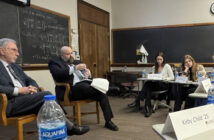
Jess Hicks
Yesterday, I spent roughly 10 hours staring at a screen.
This estimate does not include time spent checking notifications, answering texts or browsing other apps on my phone. I could venture to say half of my day was dedicated to lecture slides, Google Docs and Tasty videos.
What feels like a few minutes here and there can turn into hours — and with the time we spend on devices during classes, studying and, well, watching Netflix — the retina displays of our iPhones and LED screens of our laptops capture our attention for the better part of the day.
Meals shared with friends have turned into huddles around tables with each person hunched over their phone, engaged in a text conversation instead of one that could be taking place in front of them.
Small talk on the bus or on the way to class is seemingly non-existent because our phones have become buffers against awkward eye contact and tools to fill what used to be considered natural silence.
We rely on our phones and other devices for more than communication, organization and entertainment — they provide a sense of comfort when we don’t know what to say and make us feel less alone when we are quite literally on our own.
But the digital lives we lead have a dark side that is often forgotten.
During my first year at Lehigh, one of my first class assignments forced me to make an unexpected decision: either document every moment I engaged with a device, or turn my phone off for a week.
I did not have to think long or hard about my choice.
As a college freshman away from home for the first time, there was no way I could abandon my phone for seven days straight. So, I found a dust-covered notebook and turned it into my digital diary, carefully detailing every instance I used my phone and for what reason.
What I thought was the easiest, most logical decision actually led me to me some startling things about how I was interacting with others, and who I would become if I didn’t step back and put my phone down.
I relied on my phone far too frequently for far too much. From setting my alarm in the morning and creating reminders to reaching out to friends from home, my phone helped me get through every part of my day.
I used my phone for minuscule and massive tasks alike. I allowed it to transform from an object of convenience to an absolute necessity.
What happened to waking up to the ring of an old-fashioned alarm clock, scribbling to-do lists on notepads and crumpled up pieces of paper, or sending handwritten letters to loved ones?
Whether or not we’d like to admit it, we still have the time and space for these things amidst our chaotic schedules.
There is no question smartphones have their benefits. With their help, we have a wealth of information at our fingertips. We can have the closest thing to face-to-face conversations with family and friends hundreds of miles away. We can see and even hear the news unfold in real time, and citizen journalists can hold others accountable by simply recording a video and sending out a tweet.
For these reasons, our phones have changed the world for the better. However, we cannot allow ourselves to be complacent and all-consumed with digital life. The threat of missing out on life’s most precious moments is all too real. The ability to problem-solve, forge close bonds or have alone time is dwindling.
The Pew Research Center recently conducted a study on the future of well-being in a tech-saturated world. While about half of respondents believe the positive aspects of digital life will continue to outweigh the negative, people from a multitude of backgrounds, like professors, entrepreneurs and research scientists — those who are most often entrenched in technology — did not shy away from discussing the harmful impact social media and the Internet have on our minds and behaviors.
Hyperconnectivity that can result in attention-deficit disorder, anxiety over privacy issues, cyberbullying and loss of individual agency and the erosion of personal interaction were just some of the many profound digital deficits participants said are greatly impacting our society.
And yet most of the time, we are far too focused on our screens to notice any of these things are happening to us and those we surround ourselves with.
It’s time we put our phones down, close our laptops and strip the Apple Watches from our wrists — even for just a few minutes. We shouldn’t let go of the technologies that have shaped our world, but it is time we reclaim control of how and when we use them instead of letting them control us.
My phone, as well as my other devices, still play a significant role in my life. I use them to record interviews as a student journalist. With my embarrassingly bad sense of direction, I rely on Google Maps to get around. I take photos of my friends and moments I don’t want to forget.
But, every day, I make an effort to forget these technologies, even for just a few minutes.
_
Jessica Hicks, ’19, is the news editor for The Brown and White. She can be reached at [email protected].





Comment policy
Comments posted to The Brown and White website are reviewed by a moderator before being approved. Incendiary speech or harassing language, including comments targeted at individuals, may be deemed unacceptable and not published. Spam and other soliciting will also be declined.
The Brown and White also reserves the right to not publish entirely anonymous comments.